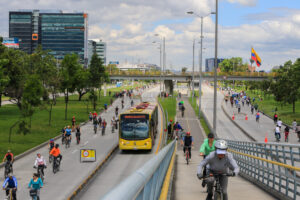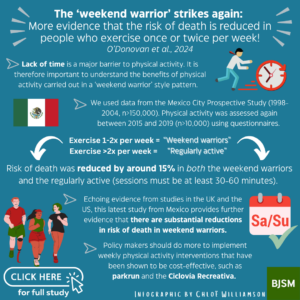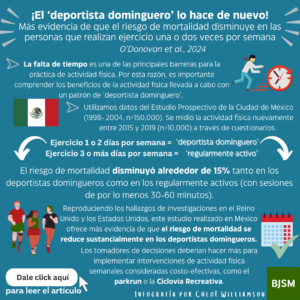Authors: Gary O’Donovan, Fanny Petermann-Rocha, and Gerson Ferrari
There has been great interest in the ‘weekend warrior’ physical activity pattern since we published the results of our large studies in the UK (1) and the US (2). These studies showed that the risk of death was reduced to a similar extent in the weekend warriors who exercised once or twice per week and in the ‘regularly active’ who exercised more often. Adding to this body of evidence, we recently published the results of our large study in Mexico in BJSM (3). The novel and important findings of our latest study are summarised below.
Infographic
Why is our study novel?
Our study is the first cohort study to investigate the benefits of the weekend warrior physical activity pattern in Latin America. Our study is also the first cohort study anywhere in the world to investigate the impacts of changes in the weekend warrior physical activity pattern over time.
Why is our study important?
Lack of time is a major barrier to physical activity around the world and most men and women say they would like to do more sport and exercise (4). Our study is important because it shows that the weekend warrior physical activity pattern could be a healthy option for busy people. Our study is also important because it provides further justification for weekly physical activity interventions such as parkrun and the Ciclovía Recreativa (Figure).
How did we conduct our investigation?
We used data from the Mexico City Prospective Study. Physical activity was assessed between 1998 and 2004 in the entire sample of more than 150,000 men and women. Physical activity was assessed again between 2015 and 2019 in a subsample of more than 10,000 participants. Physical activity was measured using questionnaires and those who exercised once or twice per week were termed weekend warriors and those who exercised more often were termed regularly active. Deaths were tracked to the end of 2020.
What did we find?
Compared with participants who reported no sport or exercise, the risk of death was reduced by around 15% in the weekend warriors and the regularly active after adjusting for age, sex, socioeconomic status, and other potential confounders. Interestingly, substantial reductions in risk only occurred when the duration of exercise sessions was at least 30-60 minutes. In the subsample with repeated measures of physical activity, we found some evidence that the risk of death was reduced in those who were or who became weekend warriors.
What are the key take-home points?
Together, our previous studies in the UK (1) and the US (2) and our latest study in Mexico (3) provide compelling evidence that there are substantial reductions in the risk of death in weekend warriors who exercise once or twice per week. Our research suggests that policy makers should do more to implement weekly physical activity interventions that have been shown to be cost-effective, such as parkrun (5) and the Ciclovía Recreativa (6). We would suggest that middle-aged and older adults take part in at least 12 weeks of walking or another moderate-intensity exercise before thinking about gradually adding running or another vigorous-intensity exercise (7). We would also suggest that anyone who has experienced chest pain, dizziness, or fainting should see their doctor before becoming more active.

Figure. The figure shows the Ciclovía Recreativa in Bogotá in Colombia. Every Sunday and public holiday more than 120 km of roads are closed to motor vehicles and around 1.5 million people enjoy walking, running, and cycling in a safe and free-of-charge environment. You can even bring your dog! The Ciclovía Recreativa takes place every week in Bogotá in Colombia, in Mexico City in Mexico, and in dozens of other cities in Latin America and surveys suggest that most of these ‘weekend warriors’ would not exercise if it were not for the intervention. Picture courtesy of Instituto Distrital de Recreación y Deporte, Bogotá, Colombia.
Infografía
References
- O’Donovan G, Lee IM, Hamer M, et al. Association of “Weekend Warrior” and Other Leisure Time Physical Activity Patterns With Risks for All-Cause, Cardiovascular Disease, and Cancer Mortality. JAMA Intern Med 2017; 177(3): 335-42.
- dos Santos M, Ferrari G, Lee DH, et al. Association of the “Weekend Warrior” and Other Leisure-time Physical Activity Patterns With All-Cause and Cause-Specific Mortality: A Nationwide Cohort Study. JAMA Intern Med 2022; 182(8): 840-8.
- O’Donovan G, Petermann-Rocha F, Ferrari G, et al. Associations of the ‘weekend warrior’ physical activity pattern with all-cause, cardiovascular disease and cancer mortality: the Mexico City Prospective Study. Br J Sports Med 2024.
- IPSOS. Global views on sports: 58% globally would like to practice more. 2021. https://www.ipsos.com/en/global-views-to-sports-2021 (accessed February 2024).
- parkrun. New study reveals parkrun delivers at least £150 million in annual wellbeing impact in the UK. 2021. https://blog.parkrun.com/uk/2021/12/23/new-study-reveals-parkrun-delivers-at-least-150-million-in-annual-wellbeing-impact-in-the-uk/ (accessed February 2024).
- Velazquez-Cortes D, Nieuwenhuijsen MJ, Jerrett M, et al. Health benefits of Open Streets programmes in Latin America: a quantitative health impact assessment. Lancet Planet Health 2023; 7(7): e590-e9.
- O’Donovan G, Sarmiento OL, Hamer M. The Rise of the “Weekend Warrior”. J Orthop Sports Phys Ther 2018; 48(8): 604-6.
Author information
Gary O’Donovan (1*), Fanny Petermann-Rocha (2, 3), and Gerson Ferrari (4, 5)
1. Facultad de Medicina, Universidad de los Andes, Bogotá, Colombia;
2. Centro de Investigación Biomédica, Facultad de Medicina, Universidad Diego Portales, Santiago, Chile;
3. School of Cardiovascular and Metabolic Health, University of Glasgow, Glasgow, UK; 4Escuela de Ciencias de la Actividad Física, el Deporte y la Salud, Universidad de Santiago de Chile (USACH), Santiago, Chile; 5Faculty of Health Sciences, Universidad Autónoma de Chile, Santiago, Chile.
*Correspondence: Gary O’Donovan, Facultad de Medicina, Universidad de los Andes, Bogotá, Colombia. Email: g.odonovan@uniandes.edu.co

